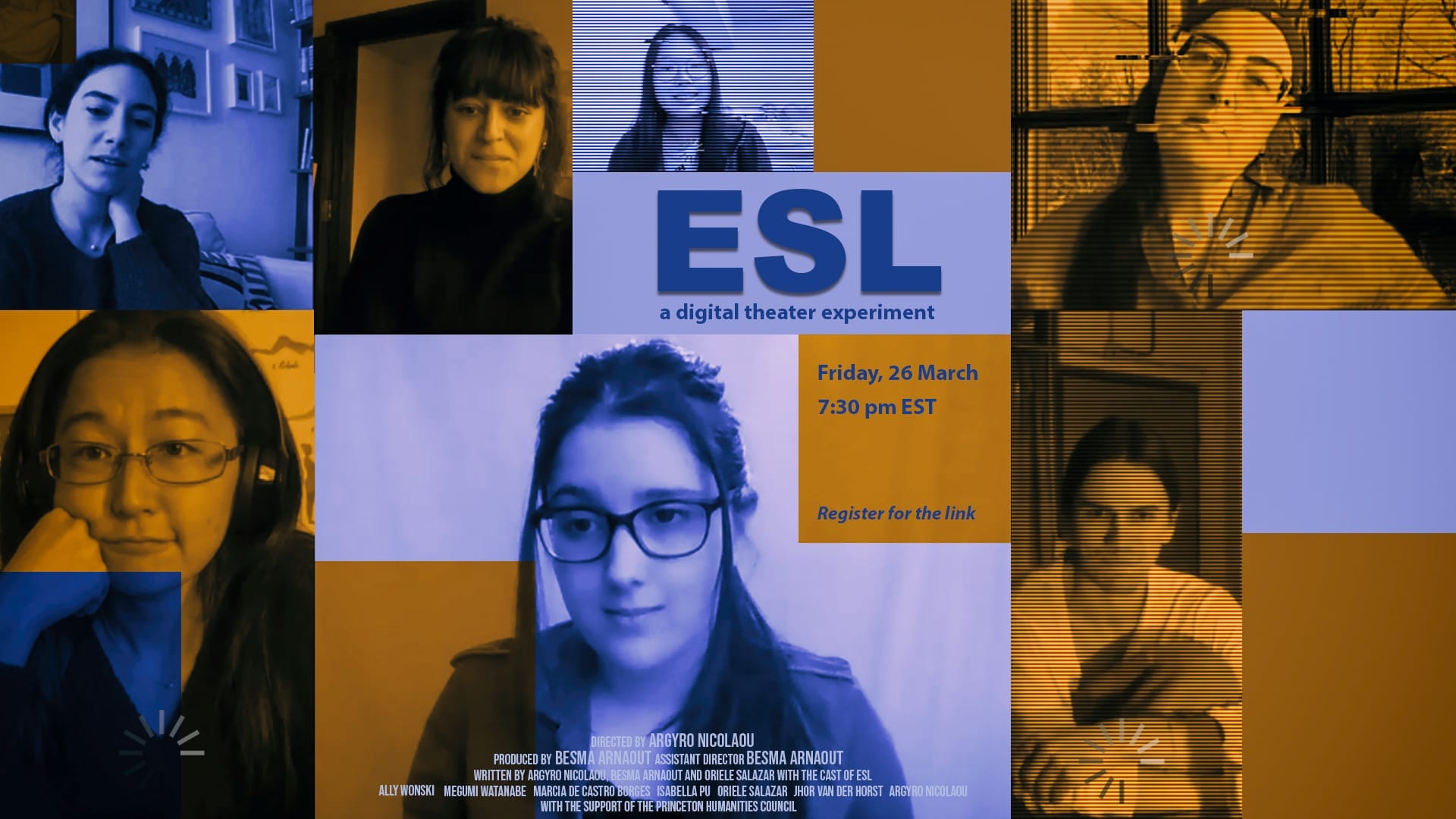By Jon Garaffa ’20
A digital theater collaboration will take the stage on Friday, March 26 as the finale to resilient-distant-creative, a Rapid Response Magic Project of the Princeton University Humanities Council. Supported by the David A. Gardner ’69 Magic Fund, Rapid Response Magic Grants bolster humanistic scholarship and community amid in-person gathering limits. The Rapid Response Magic Grant for resilient-distant-creative, an online performance and pedagogy project that examines similarities across experiences of social distancing and migration, funded software expenses, undergraduate research assistance, and a workshop to train participants in the methods of digital theater.
A comedy-drama cosponsored by the Princeton University Humanities Council and The University Center for Human Values, ESL (English as a Second Language) depicts an online language class of seven people from different cultures. When a homework assignment gets personal, the class bursts into an intense debate over the limits of language and storytelling. Throughout the play, each student explores how to best communicate his or her individual experience of migration. The story takes inspiration from the life of each cast member.
Argyro Nicolaou (Hellenic Studies) leads resilient-distant-creative and directs ESL, for which Besma Arnaout ’20 serves as producer and assistant director. Nicolaou, Arnaout, and Department of Spanish and Portuguese graduate student Oriele Benavides wrote the script with the cast. The cast includes Nicolaou and Benavides, with the other members being Isabella Pu ’23, Ally Wonski ’22, Jhor van der Horst ’20, Megumi Watanabe (East Asian Studies), and local historian of Brazilian film Marcia de Castro Borges. Pu designed promotional materials and led recruiting and casting efforts as the project’s undergraduate research assistant. ESL involves the same team members as resilient-distant-creative more broadly.
In November, Pu described her recruitment efforts for the performance in a Princeton University Humanities Council podcast. During the episode, she praised the widespread appeal of digital theater as exemplified by resilient-distant-creative. “Part of the project is showing that this kind of digital theater or distant art-making can be done by any community, any group of people, to help connect them,” Pu said.
Recruiting for ESL took place in the fall. Two Zoom meet-and-greets welcomed interested students. Email blasts targeted the listservs of campus residential colleges, as well as groups in dance, theater, poetry, and creative writing. The messages emphasized that people could join without any prior acting experience.
Additionally, the resilient-distant-creative team collaborated with Theatre Uncut, a UK-based performance collective that creates plays about current political issues and releases them, rights free, for anyone to perform. With Theatre Uncut, resilient-distant-creative screened Bubble, an online play by Kieran Hurley, for students interested in contributing to ESL. Bubble explores the nature of online debate and freedom of speech in a university context, tracking the sequence of events after a male lecturer calls a female student a degrading name. This screening gave prospective team members a taste of digital theater and its ability to grapple with social issues.
As more and more people joined the resilient-distant-creative team, Emma Callander, Artistic Director of Theatre Uncut, led a Zoom guest workshop for them and any other potential recruits, to share advice on the unique art of digital theater. In the session, she told the group members that they would advance the scholarly and artistic innovation that would inevitably arise from the global pandemic. To encourage such breakthroughs, Callander guided the participants through creative exercises to help brainstorm the script of what would ultimately become ESL.
Furthermore, to equip the cast to act effectively on camera, Callander demonstrated some techniques common in digital theater. For example, digital play actors can express their stage presence through their position with respect to their own webcam. An actor’s choice to lean close into the webcam or actively pace across a room can convey different emotions to viewers. This use of technology differentiates digital theater pieces like ESL from performances in other mediums.
The team members brought their own identities and experiences to the production process. Benavides decided to write the script because of the performance’s focus on displacement, a key issue in her home country of Venezuela. She said that while we are spending so much time in the digital world, we might as well make art from it to illuminate important subjects.
Meanwhile, a background in short film production spurred Arnaout to gravitate toward the role of producer. She joined the project after noticing the many new possibilities for art generated by the coronavirus.
“Coming out of the pandemic, we are equipped with new tools and are more courageous than we were before,” Arnaout said. “That can be intimidating, but it’s not necessarily a bad thing, as long as we are humble and thoughtful about the way we use new art practices.”
ESL integrates fiction filmmaking, documentary filmmaking, and live acting. The final product is a recording, not a live performance, because the cast had committed to acting through January and Nicolaou sought to release the piece after spring break. Yet to preserve a live element, no edits occur within each scene. An experimental endeavor open to revision, ESL seeks to explore digital theater’s potential as a tool for making art and teaching, Nicolaou said.
ESL will premiere on Friday, March 26 at 7:30 pm. The event will last about an hour, as the performance airs through a Zoom webinar, followed by a Q&A with the cast. Register to attend.
















